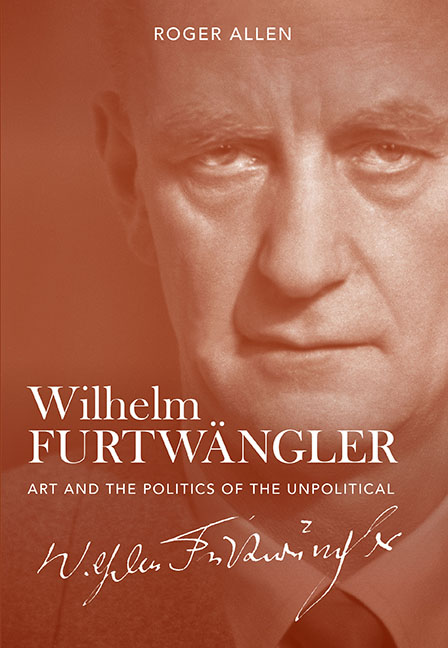Book contents
- Frontmatter
- Dedication
- Contents
- List of Illustrations
- List of Abbreviations
- Prelude
- Acknowledgements
- Preface
- Note on Translations
- Chronology
- Introduction
- 1 Wilhelm Furtwängler: The Historical, Cultural and Intellectual Background
- 2 Childhood and Youth (1886–1911)
- 3 Lübeck and Mannheim (1911–20)
- 4 Furtwängler in the Weimar Republic (1919–33)
- 5 Furtwängler and the Nazi State I (1933–35)
- 6 Furtwängler and the Nazi State II (1935–45)
- 7 Reflection and Reaction: Furtwängler in the Immediate Post-War Period (1945–50)
- 8 Furtwängler as Symphonist
- 9 ‘All Greatness is Simplicity’ (1951–54)
- 10 Afterword
- Appendix 1 Two Furtwängler Essays
- Appendix 2 Thomas Mann, ‘Germany and the Germans’ (1945)
- Appendix 3 Audio and Visual Sources
- Bibliography
- Index
1 - Wilhelm Furtwängler: The Historical, Cultural and Intellectual Background
Published online by Cambridge University Press: 17 July 2019
- Frontmatter
- Dedication
- Contents
- List of Illustrations
- List of Abbreviations
- Prelude
- Acknowledgements
- Preface
- Note on Translations
- Chronology
- Introduction
- 1 Wilhelm Furtwängler: The Historical, Cultural and Intellectual Background
- 2 Childhood and Youth (1886–1911)
- 3 Lübeck and Mannheim (1911–20)
- 4 Furtwängler in the Weimar Republic (1919–33)
- 5 Furtwängler and the Nazi State I (1933–35)
- 6 Furtwängler and the Nazi State II (1935–45)
- 7 Reflection and Reaction: Furtwängler in the Immediate Post-War Period (1945–50)
- 8 Furtwängler as Symphonist
- 9 ‘All Greatness is Simplicity’ (1951–54)
- 10 Afterword
- Appendix 1 Two Furtwängler Essays
- Appendix 2 Thomas Mann, ‘Germany and the Germans’ (1945)
- Appendix 3 Audio and Visual Sources
- Bibliography
- Index
Summary
‘The Germans’, said the new undergraduate, a grass blade in his mouth, ‘have a two-track mind and an inexcusable habit of combination; they always want one thing and the other, they want to have it both ways. They are capable of turning out great personalities with antithetic principles of thought and life. But then they muddle them, using the coinage of the one in the sense of the other; mixing everything all up and thinking they can put freedom and aristocracy, idealism and natural childlikeness under one hat. But that probably does not do.’
The Historical Background
At the time of Wilhelm Furtwängler's birth on 25 January 1886 the newly founded Second German Reich was in the process of consolidating its national identity and sense of purpose under the leadership of Kaiser Wilhelm I and Chancellor Otto von Bismarck. The increasing wealth and power of the capitalist state was a result of rapid industrialisation and internal expansion that in turn encouraged a corresponding increase in the domestic population and a growth in the size of important urban centres. In this Gründerzeit (the period which saw the foundation and growth of the German state following the proclamation of the empire in 1871) the complementary spheres of finance and industry merged and the state became the central organ of the economy. Capitalists, financiers and merchants determined the economic life of the nation, but as yet the business of government remained in the hands of the pre-capitalist and economically declining aristocracy, the Prussian ‘Junkers’, or land-owning nobility who maintained an almost feudal system of management of large estates in the north-eastern provinces. The commercially minded middle class had gained in influence as a result of growth and expansion, but within this social and economic group the educated and intellectually gifted, or Bildungsbürger, occupied a privileged position: in spite of the prevailing materialistic outlook the tradition of respect for the scholar which resonated from Germany's pre-industrial past, the age of Kant, Wilhelm and Alexander von Humboldt, and Hegel, lived on.
- Type
- Chapter
- Information
- Wilhelm FurtwänglerArt and the Politics of the Unpolitical, pp. 6 - 31Publisher: Boydell & BrewerPrint publication year: 2018



